The APAC CEO Transforming How Businesses Harness Data
In our Confessions of a CEO column, we ask the region’s business leaders to share insights aspiring start-ups can learn from. Karen Kim’s cloud data platform, Human Managed, equips enterprises with the data intelligence they need to operate more efficiently.
Confessions of a CEO: Karen Kim
- 1. Why did you decide to join Human Managed after 8 years in the corporate world?
- 2. What was it like to build this company from scratch?
- 3. How did you grow your start-up to become profitable?
- 4. What is the greatest business failure that you learned from the most?
- 5. What was the biggest investment you made that led to the biggest ROI?
- 6. What challenges have you faced as a female CEO?
- 7. Any advice for women aspiring to become leaders in male-dominated sectors?
- 8. Is there a female leader or CEO that you look up to?
- 9. What is one belief you hold that other business leaders might disagree with you on?
- 10. What is the newest thing you’ve learned as a CEO?
It’s no overstatement to say that data is the center of today’s universe. Powering businesses and society, access to and management of data is critical. For many business leaders, strengthening data management and harnessing insights is one of the most important priorities for generating business growth.
It’s essential for streamlining operations, forecasting trends, hiring talent, and analyzing the competition. And this means that data has become big business.
The data intelligence market in Asia Pacific is the fastest-growing globally, with a 10.45% CAGR expected by 2032. Data, analytics and GenAI start-ups are on the rise, with new tech business openings outpacing traditional models in many markets.
Take Human Managed, a cloud-native data platform set up to help businesses make faster and smarter decisions. Headquartered in Singapore, they operate across the Philippines, India, and Hong Kong, providing clients with personalized intelligence reports to overcome problems of information overload, siloed technologies, and legacy architecture.
We asked CEO Karen Kim to share learnings from her own data intelligence journey, and how she helped Human Managed break even in 8 months, including her biggest business wins and failures. As a female leader, Karen also delivers her take on gender equity in the workplace and the advancement of tech skills for women globally.
It’s essential for streamlining operations, forecasting trends, hiring talent, and analyzing the competition. And this means that data has become big business.
The data intelligence market in Asia Pacific is the fastest-growing globally, with a 10.45% CAGR expected by 2032. Data, analytics and GenAI start-ups are on the rise, with new tech business openings outpacing traditional models in many markets.
Take Human Managed, a cloud-native data platform set up to help businesses make faster and smarter decisions. Headquartered in Singapore, they operate across the Philippines, India, and Hong Kong, providing clients with personalized intelligence reports to overcome problems of information overload, siloed technologies, and legacy architecture.
We asked CEO Karen Kim to share learnings from her own data intelligence journey, and how she helped Human Managed break even in 8 months, including her biggest business wins and failures. As a female leader, Karen also delivers her take on gender equity in the workplace and the advancement of tech skills for women globally.

How did your data intelligence journey begin? And as first-time CEO, how did you adjust to running a start-up after 8 years in the corporate world?
Karen Kim: My first conversation with Human Managed’s founder, Saleem, left an unshakable impression on me.
He shared his vision of building a future where decisions and actions are driven by intelligence and unbiased algorithms. Although I didn't know much about working with data, AI, or platforms, something immediately clicked. I knew I had to be part of the journey somehow.
I started off part-time when the company launched in 2018, and still worked at my corporate job. I made the jump to go full-time in mid-2020. I wanted to work toward a purpose that is so much bigger than myself, with ideas, technologies, and people that inspire me.
My mindset was that of a beginner: eager, scared, and without preconceptions. I still have a beginner's mindset today, as so much of what we do has never been attempted before - it's become a baseline mode of operations for us at Human Managed.
The journey leading up to the launch of a new business can be a tough hustle. How did you work as a team to launch this start-up?
2019 was our first year of operations. It was also the year of COVID-19 and lockdowns. We had to build a company from scratch in highly volatile and unpredictable situations.
The physical restrictions meant that we were behind screens, planning and launching our business remotely. It took endless hours of Zoom calls to lay the foundations for Human Managed.
We asked each other complex questions. "What is intelligence? What is value? What is digital? What is a platform?" We tackled the big ideas head-on. Product and service development came later.
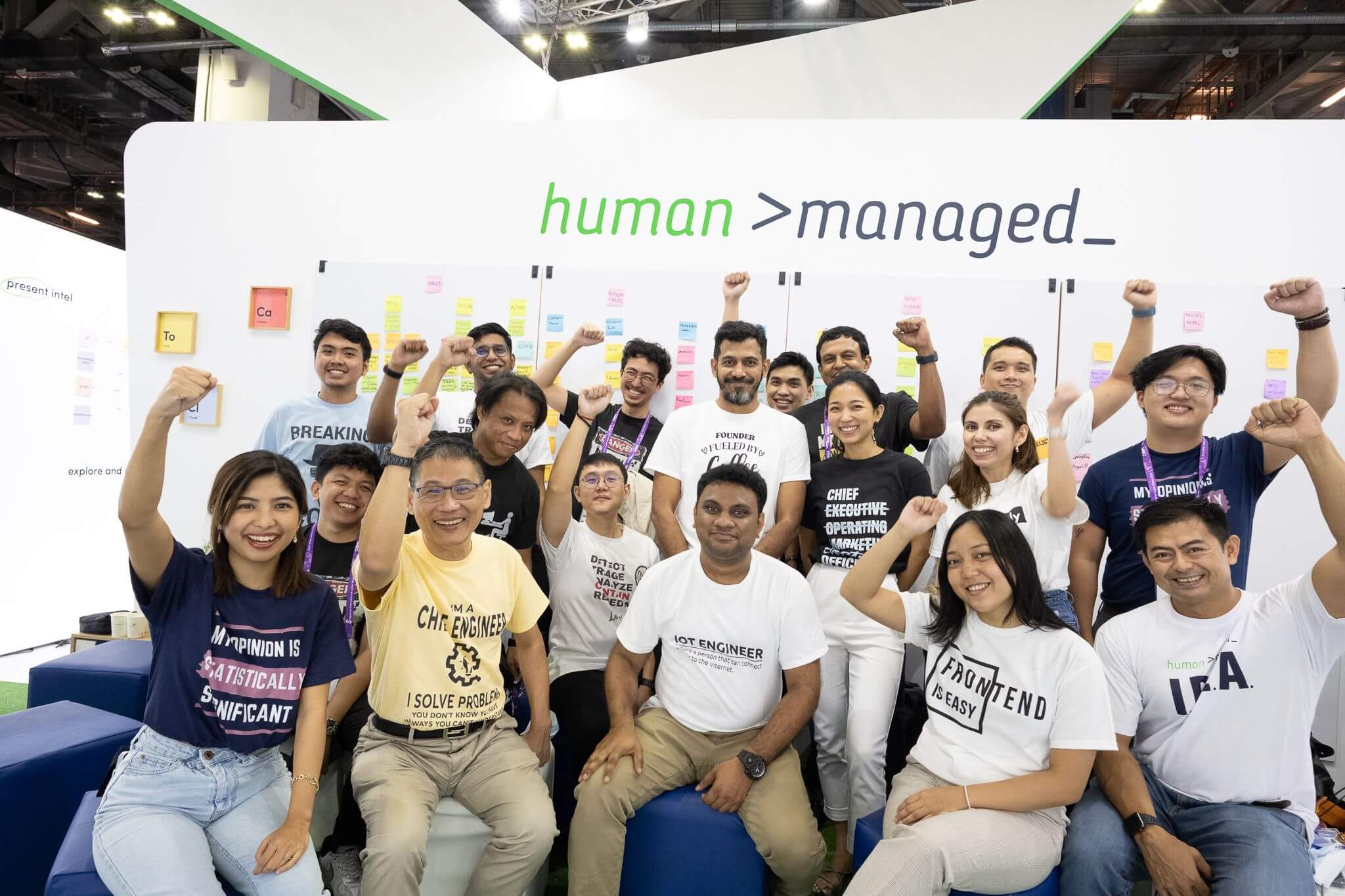
A significant output of this period was ‘Purpose to Every Task (PET)’; a set of frameworks that align our purpose to strategies, activities and tasks. We formulated our identity and brand this way, and to this day we apply PET to our strategies and operations.
When we started, all we had was our vision, a small team, and our experiences. We didn't have any platform or product. Our first few clients were our engine. Human Managed was bootstrapped from Day 1. The vision has always been to be a self-sufficient company that solves many complex problems through a multi-sided platform.
As a new entrant, it was critical to prove our credibility and build trust with customers who took a risk on us. We worked upfront and only got paid when the customer was satisfied with our outputs. We focused on differentiating ourselves by delivering value with speed, agility, and flexibility.
How did you grow your start-up to become profitable?
When we started, all we had was our vision, a small team, and our experiences. We didn't have any platform or product. Our first few clients were our engine. Human Managed was bootstrapped from Day 1. The vision has always been to be a self-sufficient company that solves many complex problems through a multi-sided platform.
As a new entrant, it was critical to prove our credibility and build trust with customers who took a risk on us. We worked upfront and only got paid when the customer was satisfied with our outputs. We focused on differentiating ourselves by delivering value with speed, agility, and flexibility.
As we understood the customer's challenges and context better, we were able to create more value with increasingly relevant and personalized outputs. We broke even in our first 8 months.
In the early days, before we established trust with our first customers and had a working platform, we signed contracts with flexible payment terms for customers, such as payment upon delivery, milestone payments, or extended payment due dates.
In hindsight, we were too eager to show value without considering the risks thoroughly. We needed to be more confident in asking for payment to cover operating costs, especially as we had proven our capabilities.
Our cash flow was affected by scenarios such as retroactive payments, disagreements on outputs, and extended proof of concepts without contract. We did more work than intended for free without proper measurements and processes.
While flexible payment terms were necessary to generate revenue, we should have acted faster to correct new contracts with terms to decrease business risk.
We made a significant investment in in late 2022, by participating in a regional cybersecurity conference in Singapore. We put up a large booth alongside industry giants, had speaking slots, and partner demo sessions. It was a bold launch of the Human Managed brand and Intelligence Decisions Actions (I.DE.A) Platform.
Describe the greatest business failure that you treasure the most.
In the early days, before we established trust with our first customers and had a working platform, we signed contracts with flexible payment terms for customers, such as payment upon delivery, milestone payments, or extended payment due dates.
In hindsight, we were too eager to show value without considering the risks thoroughly. We needed to be more confident in asking for payment to cover operating costs, especially as we had proven our capabilities.
Our cash flow was affected by scenarios such as retroactive payments, disagreements on outputs, and extended proof of concepts without contract. We did more work than intended for free without proper measurements and processes.
While flexible payment terms were necessary to generate revenue, we should have acted faster to correct new contracts with terms to decrease business risk.
What was the biggest investment you’ve made in the company that has led to the biggest ROI?
We made a significant investment in in late 2022, by participating in a regional cybersecurity conference in Singapore. We put up a large booth alongside industry giants, had speaking slots, and partner demo sessions. It was a bold launch of the Human Managed brand and Intelligence Decisions Actions (I.DE.A) Platform.

The ROI was so priceless that we now talk about Human Managed pre-GovWare vs. post-GovWare. Externally, we gained new customers and partners, and established a feedback loop for product development. Internally, we gained a tremendous amount of confidence, speed and agility. We haven't slowed down or looked back since this pivotal event.
The challenges I face are mostly passive and systemic, arising from gender-based prejudices and biases in our society.
Have you faced any challenges as a female CEO, and how have you overcome them?
The challenges I face are mostly passive and systemic, arising from gender-based prejudices and biases in our society.
While it is categorically true that I am a female CEO, it doesn't govern who I am and what I stand for. I focus on tuning into all the attributes beyond my gender that define me, and lead with all of them . This means leaning into my curiosity about the world, connecting with people and ideas, and deepening my self-awareness and self-acceptance.
This helps me break out of the "I am a female CEO in a prejudiced world" mindset and just operate with all the other qualities that I have to offer.
Gender is one of many attributes that forms your personhood and identity. If you operate thinking that the odds are stacked against you, you will always be on the backfoot.
One simple and effective method is to shift and widen your perspective. To think that you are a minority in a "male-dominated" environment is binary and could feel alienating and hostile. Instead, you can view it as having stakeholders that are primarily male, mostly from x industry, some with y interests, and a few with z experiences.
This helps me break out of the "I am a female CEO in a prejudiced world" mindset and just operate with all the other qualities that I have to offer.
What advice do you have for women aspiring to become leaders, especially in areas that are male-dominated?
Gender is one of many attributes that forms your personhood and identity. If you operate thinking that the odds are stacked against you, you will always be on the backfoot.
One simple and effective method is to shift and widen your perspective. To think that you are a minority in a "male-dominated" environment is binary and could feel alienating and hostile. Instead, you can view it as having stakeholders that are primarily male, mostly from x industry, some with y interests, and a few with z experiences.
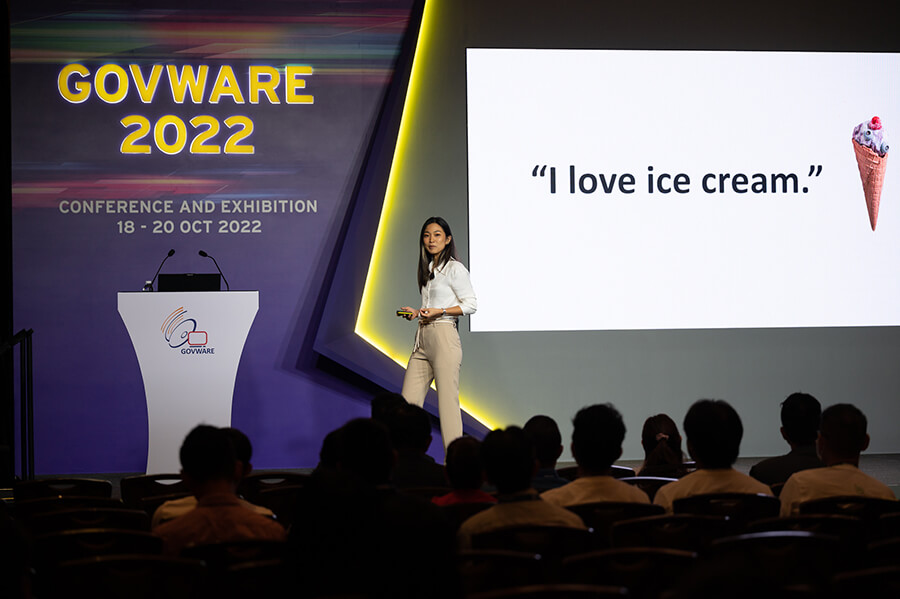
Understanding your environment this way is much more fruitful and interesting, and you are much more likely to find different ways to connect.
Lastly, check your own thoughts and behaviors. Catch yourself when you behave in ways that could perpetuate the very stereotype you’re up against. You belong here and have something "uniquely you" to offer.
Lately, I've been following Christina Cacioppo, CEO of Vanta, a security compliance automation platform. I admire Christina's journey as a problem solver and builder.
With no prior experience in security or compliance, she observed firsthand the pains organizations go through for regulatory compliance and after crystallizing the problem, decided to build software to automate the auditing process.
Christina's journey and the continued success of Vanta are living examples of what a clear vision, solution-focused product and service-obsessed mindset can achieve.
A standard advice given to businesses, particularly start-ups, is to focus on doing one thing well. While I don't disagree, this approach could narrow your value and hurt your ability to pivot in VUCA (volatility, uncertainty, complexity and ambiguity) conditions.
In the early days, when I shared our ambition to build a data-agnostic platform for cyber, risk, and digital use cases without a product, I often got looks of confusion and questions like, "Are you not trying to do too much? Why not focus on one area, like cybersecurity, and then expand to others after establishing market credibility?"
Lastly, check your own thoughts and behaviors. Catch yourself when you behave in ways that could perpetuate the very stereotype you’re up against. You belong here and have something "uniquely you" to offer.
Is there a female leader or CEO that you look up to, and why?
Lately, I've been following Christina Cacioppo, CEO of Vanta, a security compliance automation platform. I admire Christina's journey as a problem solver and builder.
With no prior experience in security or compliance, she observed firsthand the pains organizations go through for regulatory compliance and after crystallizing the problem, decided to build software to automate the auditing process.
Christina's journey and the continued success of Vanta are living examples of what a clear vision, solution-focused product and service-obsessed mindset can achieve.
What is one belief you hold that other business leaders might disagree with you on?
A standard advice given to businesses, particularly start-ups, is to focus on doing one thing well. While I don't disagree, this approach could narrow your value and hurt your ability to pivot in VUCA (volatility, uncertainty, complexity and ambiguity) conditions.
In the early days, when I shared our ambition to build a data-agnostic platform for cyber, risk, and digital use cases without a product, I often got looks of confusion and questions like, "Are you not trying to do too much? Why not focus on one area, like cybersecurity, and then expand to others after establishing market credibility?"
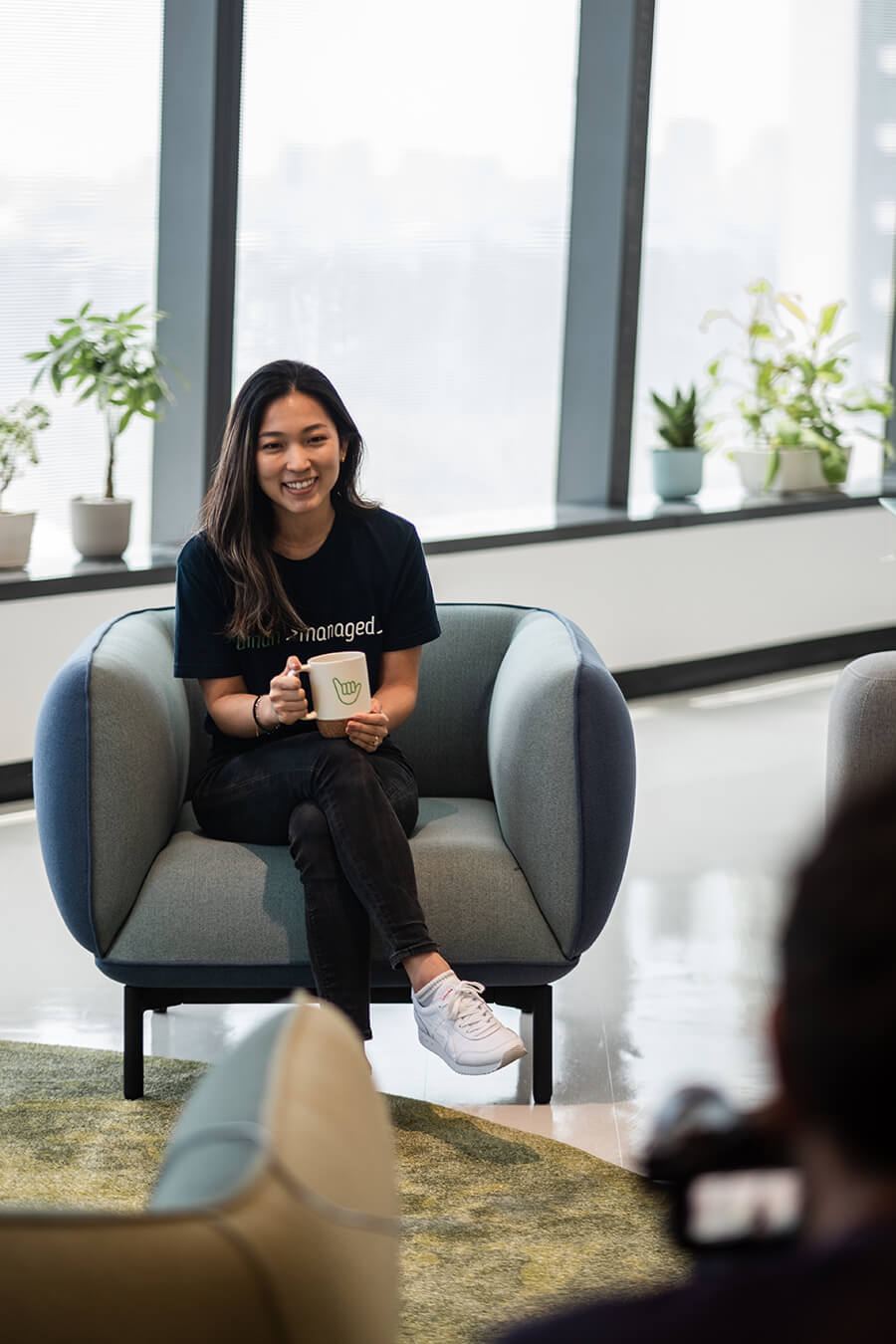
In the face of such recommendations, I had my fair share of doubt: perhaps our vision was too much, and we will only confuse the market.
But we persevered because we had such firm conviction in our ability to empower decision-making for not just one use case, but any use case. All we needed was one customer, one partner, one employee who saw something in our vision.
What resulted after three years is a cloud-native, data-agnostic modular platform of 14 functions and 92 microservices, orchestrated on demand to deliver personalized intel, recommendations and services.
Last year, we experimented with a "failing fast, correcting fast" approach. We decided to have a product release or update every week for three months. This decision was not met with enthusiasm from the team.
We were working in two to three-week release cycles before, so weekly deadlines really turned up the heat! But we stuck with the decision, and wow, did we deliver! The weekly releases produced some of the most high-impact and high-quality work for our web app to date.
While this sort of urgency in product development or any goal setting is not sustainable continuously, now and then, a planned sprint over a limited time with clear goals is very valuable in pushing yourself and the organization to the next level.
Today, the Human Managed platform consists of dozen customers in the essential services sector, 50+ technology and service partners, and 30+ employees and gigs. I am proud of the culture of creativity, innovation and problem-solving that we are building at Human Managed. And I’m excited for our future.
But we persevered because we had such firm conviction in our ability to empower decision-making for not just one use case, but any use case. All we needed was one customer, one partner, one employee who saw something in our vision.
What resulted after three years is a cloud-native, data-agnostic modular platform of 14 functions and 92 microservices, orchestrated on demand to deliver personalized intel, recommendations and services.
As someone guided by the philosophy of “trying new things”, what is the newest thing you’ve learned as a CEO and business leader?
Last year, we experimented with a "failing fast, correcting fast" approach. We decided to have a product release or update every week for three months. This decision was not met with enthusiasm from the team.
We were working in two to three-week release cycles before, so weekly deadlines really turned up the heat! But we stuck with the decision, and wow, did we deliver! The weekly releases produced some of the most high-impact and high-quality work for our web app to date.
While this sort of urgency in product development or any goal setting is not sustainable continuously, now and then, a planned sprint over a limited time with clear goals is very valuable in pushing yourself and the organization to the next level.
Today, the Human Managed platform consists of dozen customers in the essential services sector, 50+ technology and service partners, and 30+ employees and gigs. I am proud of the culture of creativity, innovation and problem-solving that we are building at Human Managed. And I’m excited for our future.
***
Our Confessions of a CEO column quizzes Asia Pacific leaders on business insights that aspiring entrepreneurs can learn from. To discover more entrepreneurship stories like Karen’s, subscribe to our monthly newsletter below, and stay tuned for the next edition.










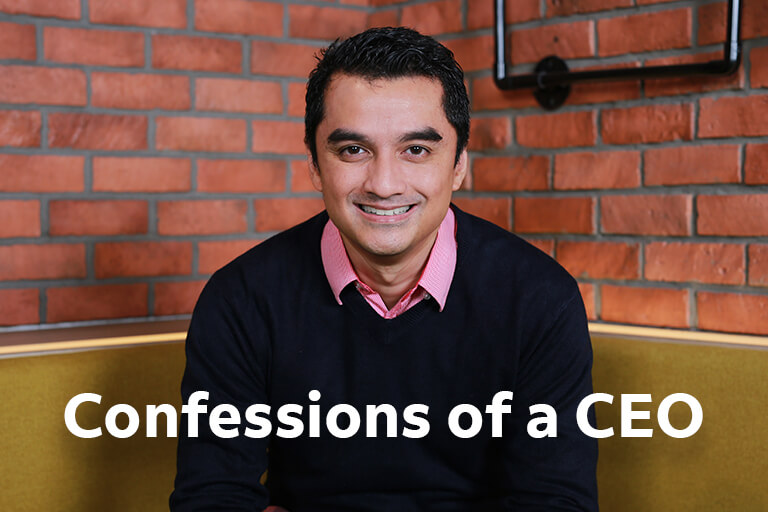
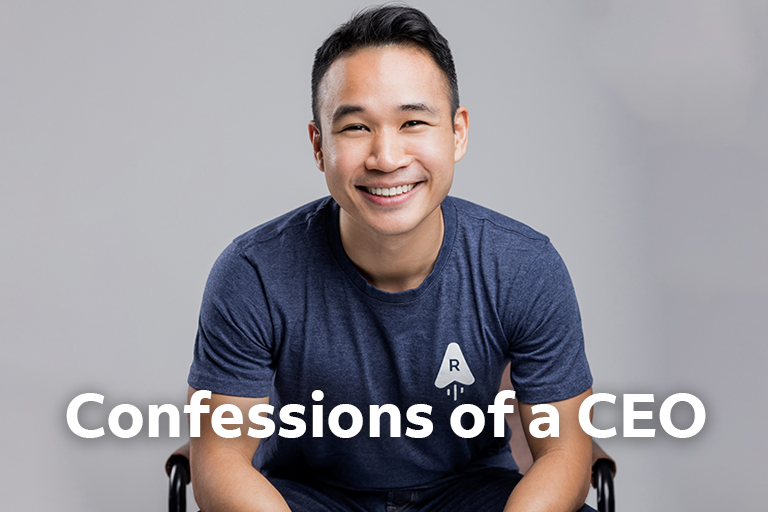






 The Latest
The Latest